Fleurs du Mal Magazine


Or see the index
In a landscape scarred by conflict, two women begin a quest for a lost child and a lost world of peace.
 Bound together by love and acceptance, their story and path interweave with fellow outcasts — people like the ever-suave Dame Blanche, Sister Asunta, martial artist and magician, Master Wu Wu, and the lost soul, Tulip — but whether peace is simply the end of war or something deeper is something they must discover for themselves.
Bound together by love and acceptance, their story and path interweave with fellow outcasts — people like the ever-suave Dame Blanche, Sister Asunta, martial artist and magician, Master Wu Wu, and the lost soul, Tulip — but whether peace is simply the end of war or something deeper is something they must discover for themselves.
A haunting tale, told in a series of visionary prose poems, The True Story of Cowboy Hat & Ingénue interweaves memory and yearning to ask questions that reflect on our past and, disturbingly, on our futures.
Maria Jastrzębska is a Polish-born poet, editor and translator. Her most recent collection was At The Library of Memories (Waterloo Press 2013) and her selected poems, The Cedars of Walpole Park, have been translated into Polish by Anna Błasiak, Paweł Gawroński and Wioletta Grzegorzewska and published bilingually (Stowarzyszenie ŻŻwych Poetów 2015). Old Knives is a selection of her work translated into Romanian by Lidia Vianu and published bilingually by Integral Contemporary Literature Press (2017). She was co-editor with Anthony Luvera of Queer in Brighton (New Writing South 2014). She co-translated Iztok Osojnik’s selected poems Elsewhere with Ana Jelnikar and her translations of Justyna Bargielska’s selected poems The Great Plan B are published by Smokestack Press (2017). Her work features in the British Library poetry and translation project Poetry Between Two Worlds. Dementia Diaries, her literary drama, toured nationally with Lewes Live Lit in 2011. Her poems have been much anthologized from The Virago Book of Wicked Verse (1992) to This Line Is Not For Turning — An Anthology of Contemporary British Prose Poetry (Cinnamon Press 2011) and Hallelujah for 50ft Women (Bloodaxe 2015). Maria lives in Brighton and you can discover more about her work on her website. (https://mariajastrzebska.wordpress.com/)
The True Story of Cowboy Hat & Ingénue
Maria Jastrzębska
Prose-poetry
Language: English
Publisher: Cinnamon Press
2018
Paperback
70 pages
ISBN-10: 1911540033
ISBN-13: 978-1911540038
Price: 14,27 euro
• fleursdumal.nl magazine
More in: #Editors Choice Archiv, - Book News, - Bookstores, Archive I-J, Archive I-J, Cowboy Poetry
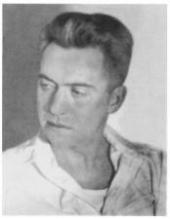
At Melville’s Tomb
Often beneath the wave, wide from this ledge
The dice of drowned men’s bones he saw bequeath
An embassy. Their numbers as he watched,
Beat on the dusty shore and were obscured.
And wrecks passed without sound of bells,
The calyx of death’s bounty giving back
A scattered chapter, livid hieroglyph,
The portent wound in corridors of shells.
Then in the circuit calm of one vast coil,
Its lashings charmed and malice reconciled,
Frosted eyes there were that lifted altars;
And silent answers crept across the stars.
Compass, quadrant and sextant contrive
No farther tides . . . High in the azure steeps
Monody shall not wake the mariner.
This fabulous shadow only the sea keeps.
Hart Crane
(1889 – 1932)
At Melville’s Tomb
• fleursdumal.nl magazine
More in: Archive C-D, Archive C-D, Crane, Hart, Herman Melville
Michael Rosen was dangerously ill from COVID at the beginning of 2020 and as doctors told him, if he hadn’t received treatment, he would have ‘gone’.
 While he was in hospital, 42% of the patients on his intensive care ward died. He spent three months in hospital, of which nearly seven weeks were in an induced coma, followed by several weeks recovering in an ordinary ward and then in a Rehabilitation Hospital.
While he was in hospital, 42% of the patients on his intensive care ward died. He spent three months in hospital, of which nearly seven weeks were in an induced coma, followed by several weeks recovering in an ordinary ward and then in a Rehabilitation Hospital.
He couldn’t walk and his memory was damaged. Three years later his hearing and eyesight are still badly affected (‘I can’t hear with my left eye, I can’t see with my left ear and I get muddled’).
Following his best-selling COVID memoirs Many Different Kinds of Love: a story of life, death and the NHS and Sticky McStickstick: the friend who helped me walk again, his new collection for grown-ups records his bewilderment with what’s happened, and shares his thoughts about the politics of the pandemic – the ‘crazed incompetence’ of the Tory government and the war against the ‘Oldies’ that led to over 200,000 dead in the UK.
Unforgiving, whimsical, grim, warm, philosophical and comical, The Advantages of Nearly Dying is a book about hospital appointments, waiting-rooms, blood-tests, brain-scans, eye-tests – and a song of praise for the NHS.
Michael Rosen, an English poet, scriptwriter, broadcaster, and performer, has been writing for children since 1970. He lives in London with his wife and five children.
The Advantages of Nearly Dying
Poems by Michael Rosen
Published: 1s Paperback edition , t March 2023
Publisher: Smokestack Books
Language: English
Paperback: 220 pages
ISBN-10:1739772296
ISBN-13:978-1739772291
£8.99
• fleursdumal.nl magazine
More in: #Editors Choice Archiv, - Book News, - Bookstores, Archive Q-R, Archive Q-R, DRUGS & DISEASE & MEDICINE & LITERATURE
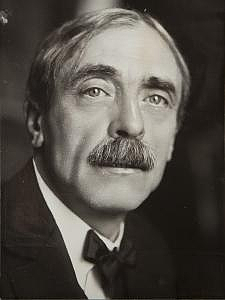
Même féerie
La lune mince verse une lueur sacrée,
Comme une jupe d’un tissu d’argent léger,
Sur les masses de marbre où marche et croit songer
Quelque vierge de perle et de gaze nacrée.
Pour les cygnes soyeux qui frôlent les roseaux
De carènes de plume à demi lumineuse,
Sa main cueille et dispense une rose neigeuse
Dont les pétales font des cercles sur les eaux.
Délicieux désert, solitude pâmée,
Quand le remous de l’eau par la lune lamée
Compte éternellement ses échos de cristal,
Quel cœur pourrait souffrir l’inexorable charme
De la nuit éclatante au firmament fatal,
Sans tirer de soi-même un cri pur comme une arme ?
Paul Valéry
(1871-1945)
Même féerie
Poème
Album de vers anciens
• fleursdumal.nl magazine
More in: Archive U-V, Archive U-V, Valéry, Paul
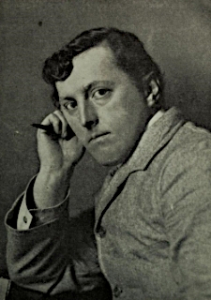
Orestes
Me in far lands did Justice call, cold queen
Among the dead, who after heat and haste
At length have leisure for her steadfast voice,
That gathers peace from the great deeps of hell.
She call’d me, saying: ‘I heard a cry by night!
Go thou, and question not; within thy halls
My will awaits fulfilment. Lo, the dead
Cries out before me in the under-world.
Seek not to justify thyself: in me
Be strong, and I will show thee wise in time;
For, though my face be dark, yet unto those
Who truly follow me through storm or shine,
For these the veil shall fall, and they shall see
They walked with Wisdom, though they knew her not.’
So sped I home; and from the under-world
Forever came a wind that fill’d my sails,
Cold, like a spirit! and ever her still voice
Spoke over shoreless seas and fathomless deeps,
And in great calms, as from a colder world;
Nor slack’d I sail by day, nor yet when night
Fell on my running keel, and now would burn,
With all her eyes, my errand into me.
So sped I on, fill’d with a voice divine:
And hardly wist I whom I was to slay,
My mother! but a vague, heroic dream
Possess’d me; fired to do the will of gods,
I lost the man in minister of Heaven;
Nor took I note of sandbank, nor of storm,
Nor of the ocean’s thunders, when the shores
All round had faded, leaving me alone:
I knew I could not die, till I had slain!
But, when I came once more upon the land
That rear’d me, all the sweetness of old days
Came back on me: I stood, as from a dream
Waked to a sudden, sad reality.
And when, far off, I saw those ancient towers,
The palaces and places of my youth,
I long’d to fall into my mother’s arms,
And tell a thousand tales of near escapes.
And lo! the nurse, that fondled me of yore,
Fell with glad tears upon my neck, and told
How she, and how my mother, all this while
Had dream’d of all I was to do, and said
How dear I should be to my mother’s eyes.
Her words shook me, but shook not my resolve.
For even then there came that sterner voice,
Echoing to what was highest in the soul.
Then, like to those who have a work on earth,
And put far from them lips of wife or child,
And gird them to the accomplishment; so I
Strode in, nor saw at all mine ancient halls;
And struck my father’s murderess, not my mother.
And, when I had smitten, lo, the strength of gods
Pass’d from me, and the old, familiar halls
Reel’d back on me; dim statues, that of old
Holding my mother’s hand I marvell’d at,
And questioned her of each. And she lies there,
My mother! ay, my mother now; O hair
That once I play’d with in these halls! O eyes
That for a moment knew me as I came,
And lighten’d up, and trembled into love;
The next were darkened by my hand! Ah me!
Ye will not look upon me in that world.
Yet thou, perchance, art happier, if thou go’st
Into some land of wind and drifting leaves,
To sleep without a star; but as for me,
Hell hungers, and the restless Furies wait.
Then the dark Curse, that sits upon the towers,
Bow’d down her awful head, thus satisfied,
And I fled forth, a murderer, through the world.
Stephen Phillips
(1864 – 1915)
Orestes
• fleursdumal.nl magazine
More in: #Editors Choice Archiv, Archive O-P, Archive O-P
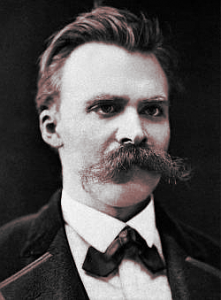
Das Wort
Lebendgem Worte bin ich gut:
Das springt heran so wohlgemut,
das grüßt mit artigem Geschick,
hat Blut in sich, kann herzhaft schnauben,
kriecht dann zum Ohre selbst dem Tauben
und ringelt sich und flattert jetzt
und was es tut, das Wort ergötzt.
Doch bleibt das Wort ein zartes Wesen,
bald krank und aber bald genesen.
Willst ihm sein kleines Leben lassen,
mußt du es leicht und zierlich fassen,
nicht plump betasten und bedrücken,
es stirbt oft schon an bösen Blicken –
und liegt dann da, so ungestalt,
so seelenlos, so arm und kalt,
sein kleiner Leichnam arg verwandelt,
von Tod und Sterben mißgehandelt.
Ein totes Wort – ein häßlich Ding,
ein klapperdürres Kling-Kling-Kling.
Pfui allen häßlichen Gewerben,
an denen Wort und Wörter sterben.
Friedrich Nietzsche
(1844 – 1900)
Das Wort
• fleursdumal.nl magazine
More in: Archive M-N, Archive M-N, Friedrich Nietzsche, Nietzsche
Du vitriol, du sucre, du vice et de la vertu déversés dans un cocktail explosif tracé de mon stylographe corrosif.
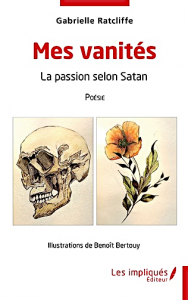 Vous trouverez dans cet ouvrage des réactions à l’intolérable, des rédemptions aimables et le récit d’angoisses et de poisse.
Vous trouverez dans cet ouvrage des réactions à l’intolérable, des rédemptions aimables et le récit d’angoisses et de poisse.
Un verre de prose légère et particulière, qui je l’espère, ne saura vous déplaire. A consommer sans modération.
Gabrielle Ratcliffe, née à Munich, manie le langage avec passion dans toute sa richesse. Aussi, les mots qu’elle dresse et adresse finissent par rendre ses écrits simples et limpides.
Elle noircit sans cesse le papier où qu’elle soit et quelle que soit son humeur. Singulière parce que plurielle !
Benoît Bertouy, dessinateur au cœur de génie, illustre avec parcimonie et rigueur, de son crayon, magique, sa prose, telles deux âmes sœurs.
MES VANITÉS
La passion selon Satan.
Poésie
Gabrielle Ratcliffe
Illustrations de Benoit Bertouy
Les Impliqués
Editions L’HARMATTAN
Date de publication: 13 décembre 2022
Langue: Français
Broché format: 13,5 x 21,5 cm
174 pages
ISBN : 978-2-38417-707-3
EAN13 : 9782384177073
Livre papier:
€ 17,5
• fleursdumal.nl magazine
More in: #Editors Choice Archiv, - Book News, - Bookstores, Archive Q-R, Archive Q-R
Marieke Lucas Rijneveld komt met een nieuwe roman.
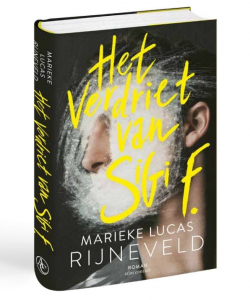
In de fictiebrochure van Atlas Contact staat een vooraankondiging van de nieuwe roman van Rijneveld.
Het verdriet van Sigi F. is de titel. Wanneer deze roman precies verschijnt is nog niet duidelijk (voorjaar, zomer, najaar?). Over de inhoud is verder ook nog niets bekend.
Marieke Lucas Rijneveld
Het verdriet van Sigi F.
Roman
• fleursdumal.nl magazine
More in: #Editors Choice Archiv, - Book Lovers, - Book News, - Bookstores, Archive Q-R, Archive Q-R, Marieke Lucas Rijneveld, Rijneveld, Marieke Lucas
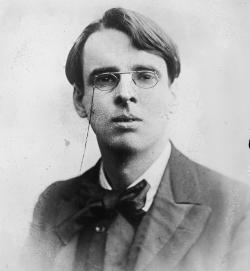
All Things can tempt Me
All things can tempt me from this craft of verse:
One time it was a woman’s face, or worse –
The seeming needs of my fool-driven land;
Now nothing but comes readier to the hand
Than this accustomed toil. When I was young,
I had not given a penny for a song
Did not the poet sing it with such airs
That one believed he had a sword upstairs;
Yet would be now, could I but have my wish,
Colder and dumber and deafer than a fish.
William Butler Yeats
(1865-1939)
All Things can tempt Me
• fleursdumal.nl magazine
More in: Archive Y-Z, Archive Y-Z, Yeats, William Butler
Voor Cees Nooteboom, auteur van een imposant internationaal oeuvre, komen zijn gedichten op de eerste plaats.
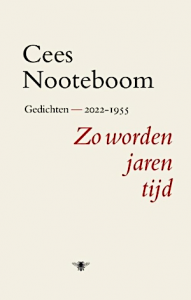 Zijn poëzie gaat over waarnemen en zien, en al bijna zeventig jaar is het voor hem een vorm van ascese, van mediteren; een manier van denken. In zijn gedichten stelt hij zich vragen over het wezen van de tijd, de zielsverhuizingen van een mens tijdens zijn leven of de ontvankelijkheid voor poëzie bij hemzelf of collega-dichters.
Zijn poëzie gaat over waarnemen en zien, en al bijna zeventig jaar is het voor hem een vorm van ascese, van mediteren; een manier van denken. In zijn gedichten stelt hij zich vragen over het wezen van de tijd, de zielsverhuizingen van een mens tijdens zijn leven of de ontvankelijkheid voor poëzie bij hemzelf of collega-dichters.
Lang heeft Cees Nooteboom gewacht om al zijn gedichten in één band bijeen te brengen. Aan de vooravond van zijn negentigste verjaardag zal deze grootse literaire gebeurtenis eindelijk plaatsvinden.
Cees Nooteboom (31 juli 1933) wordt beschouwd als een van de belangrijkste Nederlandse schrijvers. In zijn jeugd trok hij na een opleiding in kloosterscholen liftend door Europa, een gebeurtenis die hij gebruikte voor zijn debuutroman Philip en de anderen (1955).
Een jaar later verscheen zijn poëziedebuut De doden zoeken een huis. In 1956 begon hij ook aan een ander deel van zijn carrière, de reisjournalistiek. Hij schreef reportages en reisverhalen voor onder andere Het Parool, Elsevier, en de Volkskrant. Vanaf 1968 vond hij zijn eigen plek bij het glossy tijdschrift Avenue.
In 1963 werden zijn reisverhalen gebundeld onder de titel Een middag in Bruay, gevolgd door Een nacht in Tunesië (1965) en Een avond in Isfahan (1978). Met Rituelen (1980, F. Bordewijkprijs en de Amerikaanse Pegasusprijs voor de beste niet-Amerikaanse roman) brak Nooteboom door bij het grote publiek.
In 1992 ontving Nooteboom de Constantijn Huygensprijs voor zijn volledige oeuvre. In 2003 kreeg hij de Oostenrijkse Staatsprijs voor Europese Literatuur, en in 2004 werd hem de P.C. Hooftprijs toegekend. In het najaar van 2009 ontving hij uit handen van koning Albert de prestigieuze Prijs der Nederlandse Letteren, die een keer per drie jaar door de Nederlandse Taalunie wordt toegekend.
Naast romans, poëzie en reisverhalen schreef hij ook enkele toneelstukken. Zijn boeken worden in meer dan dertig talen vertaald. In 2023 verschijnen zijn verzamelde gedichten onder de titel ‘Zo worden jaren tijd’.
Zo worden jaren tijd
Gedichten 2022-1955
Auteur: Cees Nooteboom
Uitgever: De Bezige Bij
Taal: Nederlands
Gebonden
26 januari 2023
Aantal pagina’s: 656
ISBN: 9789403161716
NUR: 306
Prijs: 49,99
• fleursdumal.nl magazine
More in: - Book News, - Bookstores, Archive M-N, Archive M-N, Cees Nooteboom
Gabrielle Bates’s electric debut collection Judas Goat plumbs the depths of intimate relationships.
The book’s eponymous animal is used to lead sheep to slaughter while its own life is spared, its harrowing existence echoes through this spellbinding collection of forty poems, which wrestle with betrayal and forced obedience, violence and young womanhood, and the “forbidden felt language” of sexual and sacred love.
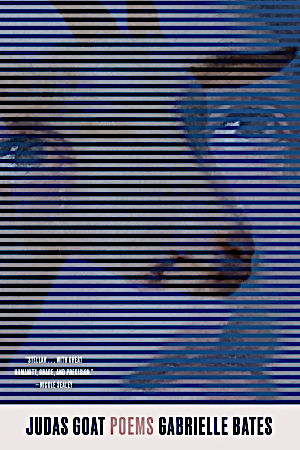
These poems conjure encounters with figures from scriptures, domesticated animals eyeing the wild, and mothering as a shapeshifting, spectral force; they question what it means to love another person and how to exorcise childhood fears. All the while, the Deep South haunts, and no matter how far away the speaker moves, the South always draws her back home.
In confession, in illumination, Bates establishes herself as an unflinching witness to the risks that desire necessitates, as Judas Goat holds readers close and whispers its unforgettable lines.
For a long time, the only part of my poems anyone praised
were the endings.
I didn’t mind.
The way I understood it, if the ending was good,
it cast goodness back over the whole.
I thought we could be saved at the last minute.
Gabrielle Bates is the author of the debut poetry collection Judas Goat (Tin House, 2023). Her work has appeared in the New Yorker, Poetry Magazine, Ploughshares, APR, Virginia Quarterly Review, New England Review, Gulf Coast, Mississippi Review, Black Warrior Review, the Best of the Net anthology, and BAX: Best American Experimental Writing, among other journals and anthologies, and her poetry comics have been featured internationally in a variety of exhibitions, festivals, and conferences. Originally from Birmingham, Alabama, she currently lives in Seattle, where she serves as the Social Media Manager of Open Books: A Poem Emporium, a contributing editor for Bull City Press, and a University of Washington teaching fellow. With Luther Hughes and Dujie Tahat, she co-hosts the podcast The Poet Salon, where poets talk over drinks.
Judas Goat: Poems
by Gabrielle Bates (Author)
January 24, 2023
Publisher: Tin House Books (January 24, 2023)
Language: English
Paperback
104 pages
ISBN-10: 1953534643
ISBN-13: 978-1953534644
$16.95
• fleursdumal.nl magazine
More in: #Editors Choice Archiv, - Book News, - Bookstores, Archive A-B, Archive A-B

The Prisoner
All day I lie beneath the great pine tree,
Whose perfumed branches wave and shadow me.
I hear the groaning of its straining heart
As in the breeze its thin leaves meet and part
Like frantic fingers loosened and entwined;
I hear it whisper to the sighing wind,
“What of the mountain peaks, where I was born?”
As sharp tears drop I feel its falling thorn.
I see in the far clouds the wild geese fly,
Homeward once more, free, in the storm-swept sky.
Back to the land they loved, all, all, have gone,
How swift the flight by joy and hope led on.
“What of the mountain land where I was born?”
I cry, they pass, glad in the dawning morn,
Home to the moon-pale lake, the heath-clad hill,
And give no thought for one imprisoned still
All day I lie beneath the sad pine tree,
Whose groaning branches wave and shadow me,
Chained to the earth, the dark clay of the grave,
In helpless fashion feel its wild heart rave.
“Free, set free,” I hear its moaning breath,
Where liberty means naught, alas, but death
Ah, freedom is but death.
Dora Maria Sigerson Shorter
(1866 – 1918)
The Prisoner
• fleursdumal.nl magazine
More in: Archive S-T, Archive S-T, Sigerson Shorter, Dora Maria, WAR & PEACE
Thank you for reading Fleurs du Mal - magazine for art & literature